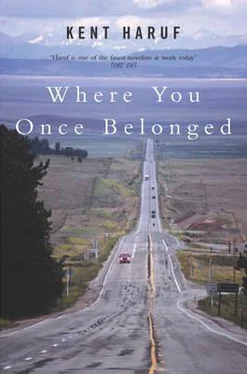Kent Haruf - Where You Once Belonged
Здесь есть возможность читать онлайн «Kent Haruf - Where You Once Belonged» весь текст электронной книги совершенно бесплатно (целиком полную версию без сокращений). В некоторых случаях можно слушать аудио, скачать через торрент в формате fb2 и присутствует краткое содержание. Год выпуска: 2004, Издательство: Pan MacMillan, Жанр: Современная проза, на английском языке. Описание произведения, (предисловие) а так же отзывы посетителей доступны на портале библиотеки ЛибКат.
- Название:Where You Once Belonged
- Автор:
- Издательство:Pan MacMillan
- Жанр:
- Год:2004
- ISBN:нет данных
- Рейтинг книги:5 / 5. Голосов: 1
-
Избранное:Добавить в избранное
- Отзывы:
-
Ваша оценка:
- 100
- 1
- 2
- 3
- 4
- 5
Where You Once Belonged: краткое содержание, описание и аннотация
Предлагаем к чтению аннотацию, описание, краткое содержание или предисловие (зависит от того, что написал сам автор книги «Where You Once Belonged»). Если вы не нашли необходимую информацию о книге — напишите в комментариях, мы постараемся отыскать её.
Where You Once Belonged — читать онлайн бесплатно полную книгу (весь текст) целиком
Ниже представлен текст книги, разбитый по страницам. Система сохранения места последней прочитанной страницы, позволяет с удобством читать онлайн бесплатно книгу «Where You Once Belonged», без необходимости каждый раз заново искать на чём Вы остановились. Поставьте закладку, и сможете в любой момент перейти на страницу, на которой закончили чтение.
Интервал:
Закладка:
Then the band broke for ten minutes and the local men bought her drinks again at the bar. While they stood around her, not speaking to her very much but merely talking and joking among themselves while still paying close attention to the level of liquor in her glass, the rest of the people in the Legion that night were also ordering fresh drinks. The two or three barmaids were kept busy carrying trays of glasses and bottles out to them in the booths. Across the room somebody started throwing ice cubes at one of the barmaids to get her attention. “Stop that,” she called. “I see you — I’ll be there in a minute.”
Then the ten-minute break was over. The band resumed their places at the far end of the room and began to play. And Alden Haines led Jessie out onto the floor again. It was a fast song, the band’s rendition of “That’ll Be the Day.” He swung her violently out at the end of his arm — and that was the end of it. Almost before it had begun, it was finished, completed. I suppose it was the ice cubes on the floor. Or perhaps during the break someone had spilled beer or liquor in the dance area. No one was certain what it was. But in any case, her foot slipped on something wet and she went down. She tried to catch herself when she fell but she couldn’t; she fell forward, hard, and didn’t get up immediately. Afterward she lay there in her red dress while the people around her stopped dancing. She turned onto her side, pulling her legs upward against herself. Haines leaned over her.
“You all right?” he said. “Can you get up?”
He lifted under her arm, helping her to stand. She was very pale. She was sweating again now, her face shining like wet chalk in the dim light. In the center of the dance floor she stood unsteadily on her feet while Alden Haines held her arm and people watched. “I think I need to go to the rest room,” she said.
“You want me to walk you upstairs?”
“No. I want to be alone.”
Later it was obvious that the pains had already begun while she was so still on the dance floor — those who were there remember seeing her eyes focus peculiarly, a kind of brief intermittent stare — but she refused any assistance. She walked off the dance floor by herself, past the bar and up the stairs to the rest room near the front entrance. She went inside, into one of the toilet stalls, and sat down. They waited for her to come back. When she was still there ten minutes later, a couple of women went in to check on her. She was still seated on the toilet, still conscious but quiet and very white. She was bent forward over her knees. There were clots of blood in the toilet. One of the women came outside into the hallway and said they should call the ambulance.
The ambulance got there in five or six minutes. The attendants went in and brought her back out in a wheelchair, tipping it backward to get down the front steps, and then they pushed the chair up a ramp into the ambulance and drove to the hospital. None of that took very long — the hospital is only three or four blocks east of the Legion — but it wouldn’t have mattered if it had taken an hour.
When they arrived at the hospital, they wheeled her into the emergency room and Dr. Martin laid her down on a bed and examined her. He lifted her dress and noticed the blood. Then he listened for fetal heart tones. He couldn’t hear anything, though: the little girl inside her was already dead. Afterward he said the placenta and uterine walls had separated. When she fell, she had gone immediately into labor, and because its source of oxygen had been cut off, the baby had died within minutes — probably during the time Jessie was still in the rest room. He didn’t tell her that, though. He didn’t want to upset her: she still had to deliver the baby.
They gave her Pitocin to help stimulate the contractions. But she was in labor for nearly ten hours and there was additional loss of blood and she might have died. But finally she delivered the baby late on Sunday evening.
Afterward they held it up so she could look at it for a moment. The little girl was ashen but otherwise it looked quite normal. Jessie reached up and touched one of its feet. Then they took it away and one of the nurses said: “I’m so sorry, Mrs. Burdette.”
So people in Holt thought she would cry then. They thought she would break down at last. I suppose they wanted her to do that. But she didn’t. Perhaps she had gone past the point where human tears make any difference in such cases, because instead, she turned her face away and shut her eyes and after a while she went to sleep.
She stayed in the hospital for most of that next week. Mrs. Waters, her neighbor, took it upon herself to care for TJ and Bobby during that period. The old woman brought them in to see their mother as soon as she was able to have company and Jessie talked to them every day and held their hands and brushed the hair off their foreheads. She refused, however, to talk to any of the hospital staff about the little girl she had delivered and she refused absolutely to talk to a local minister when he came to her room to visit her. She preferred to lie quietly, looking out the window. When the week was over, they released her and she went home again, to the old Fenner house on Hawthorne Street. And then in another week she returned to work at the Holt Cafe. In the following months she continued to refill the townspeople’s cups with coffee and to bring them steak and potatoes from the kitchen.
And so I don’t know what monetary value people place on baby girls in other areas, but here we learned in May that year that $150,000—less the resale value of a two-bedroom house in the middle of town — was a figure that seemed appropriate.
9
That was in the spring of 1977. Afterward things in Holt returned to a quiet normalcy. Jessie continued to live at the west edge of town with her sons. The two boys were growing up and she went on working every day at the Holt Cafe and gradually people in town stopped talking about her husband. Of course Charlie Soames was still here. He was still nodding his head and lisping nonsense while he watered the grass or sat on the front porch swing. But in time people grew used to his altered presence, so that it was no longer maddening to see him. They began to forget about his part in the events of that spring. They thought of him now, if they happened to think of him at all, as just an old empty-headed man who lived in town on Cedar Street. Matters in Holt grew quiet and routine once more.
Then in the summer of 1982 another series of events began which ultimately had relevance for this story. These events began with the death of another girl in Holt.
She was a beautiful child. She resembled her mother. She had Nora’s rich black hair and white skin, and she was small-boned and bright and neat looking, and she had her mother’s blue eyes. But she was like me too, in some ways. She didn’t like to stay home. She wanted to be out where there was something happening; she wanted to know things.
So she was a favorite among her friends, and when she was a teenager she was out of the house most of the time, going places, even if it was only to ride up and down Main Street in someone’s car. She and her mother were very close, however. And I believe Nora was silently pleased that Toni was unlike herself in that one regard at least, that she was lively and gregarious and had friends, because Nora had very few friends and was often very lonely in Holt. Nora had never liked living here; it was too raw for her; there wasn’t the slightest hint of any culture that she could recognize. Consequently she spent much of her time alone, gardening in the backyard, growing roses, and she read a great deal. Then too, she would often drive to Boulder for a weekend, to visit her aging father, Dr. Kramer, the old professor. Afterward she would come back to Holt and appear to be cheerful for a day or two. But it would never last. After eighteen years of marriage we had achieved an unhappy and silent compromise: for Toni’s sake we stayed together. We didn’t talk about the future and while we were generally kind in our daughter’s presence and made a pretense at being contented, we were essentially indifferent to one another. But in the summer of 1982 even that seemed too much to pretend about any longer.
Читать дальшеИнтервал:
Закладка:
Похожие книги на «Where You Once Belonged»
Представляем Вашему вниманию похожие книги на «Where You Once Belonged» списком для выбора. Мы отобрали схожую по названию и смыслу литературу в надежде предоставить читателям больше вариантов отыскать новые, интересные, ещё непрочитанные произведения.
Обсуждение, отзывы о книге «Where You Once Belonged» и просто собственные мнения читателей. Оставьте ваши комментарии, напишите, что Вы думаете о произведении, его смысле или главных героях. Укажите что конкретно понравилось, а что нет, и почему Вы так считаете.












